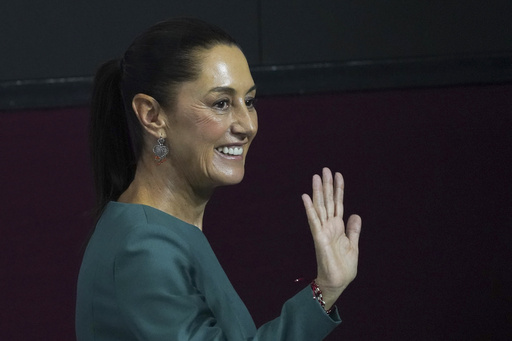
Mexico’s President Andrés Manuel López Obrador revealed plans for a significant expansion of the country’s passenger rail network under the upcoming administration of president-elect Claudia Sheinbaum. The ambitious project aims to construct three new passenger train lines extending from Mexico City to various cities on the U.S. border. Sheinbaum intends to build approximately 1,850 miles (3,000 kilometers) of electric train routes, doubling the amount constructed during López Obrador’s term.
The proposed passenger trains are planned to operate at speeds of up to 100 mph (160 kph) and would mark a shift from Mexico’s current reliance on diesel-powered freight trains. Sheinbaum outlined the first phase of the project, which includes a line from Mexico City to Nuevo Laredo, a distance of around 680 miles (1,100 kilometers) at an estimated cost of $22 billion. However, concerns have been raised regarding potential cost overruns, as seen in previous railroad endeavors in the country.
Additionally, Sheinbaum envisions another line connecting Mexico City with Guadalajara at an estimated cost of $3 billion, with the possibility of extending the route to border cities like Nogales, depending on the project timeline. The construction plan involves army engineers overseeing private contractors while utilizing existing railway rights-of-way, possibly requiring the relocation of current freight lines to accommodate the new tracks and causing disruptions in freight services.
Despite previous proposals for freight operators to provide passenger service, this plan seems to have been put on hold by López Obrador. The extensive project is expected to surpass the scale of previous railway initiatives under his administration, which include the Maya tourist train and the commuter railway linking Mexico City to Toluca, contributing to a significant budget deficit this year.
Critics have raised doubts about the demand for passenger rail services to far-flung border cities, emphasizing that Mexico’s transportation habits predominantly rely on cars, buses, and planes. Observers note the lack of infrastructure to connect Mexican rail lines to U.S. border cities, highlighting potential challenges in the network’s effectiveness and ridership.
Both López Obrador and Sheinbaum, members of the Morena party, share a commitment to advancing existing policies, with the latter pledging to continue or expand upon López Obrador’s initiatives. While López Obrador views the rail expansion as a means to boost employment and stimulate economic growth, concerns linger over the financial implications and practicality of the proposed rail network expansion.
